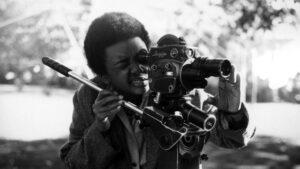Female gaze: female directors at Il Cinema Ritrovato

Tonight in Piazza Maggiore we will watch to astonishing female directed films: Alice Rohrwacher will present the italian première of her new short film Le pupille, followed by the restoration of Korotkie vstreči (Brief Encounters), first film by the moldavian director Kira Muratova. Rohrwacher and Muratova aren’t the only female directors whose unique gaze enlighten this edition of Il Cinema Ritrovato.
Among the female filmmakers in the festivla programma there is, of coures, Agnes Varda, by whom we have already watched (and will watch again during the festival) two short documentaries, Christmas Carole (Franc3/1965) and the interview to Pier Paolo Pasolini she shot in New York in 1967 – some of you could have already appreciated a ‘short’ version of this film visiting the exhibition Folgorazioni Figurative.
 Director and Actress Ana Maria Magalhäes with Já que ninguém me tira para dançar (Brasil /2021) rescues Leila Diniz’s role in modern culture, as an artist who stood up for women’s freedom during the harshest years of the military dictatorship in Brazil in the 1960s. Authentic and spontaneous, Diniz was the spokeswoman for a censored generation. She won hearts and minds under the sign of love and at the same time generated hostility from defenders of morals and conservatives, especially after posing in a bikini for a magazine, at eight months pregnant. Diniz spoke openly about everything, including her sexuality. Just like rebels Janis Joplin and Amy Winehouse, Diniz died at the age of 27, in a plane crash in India, while returning from a film festival in Australia, where she received the best actress award.
Director and Actress Ana Maria Magalhäes with Já que ninguém me tira para dançar (Brasil /2021) rescues Leila Diniz’s role in modern culture, as an artist who stood up for women’s freedom during the harshest years of the military dictatorship in Brazil in the 1960s. Authentic and spontaneous, Diniz was the spokeswoman for a censored generation. She won hearts and minds under the sign of love and at the same time generated hostility from defenders of morals and conservatives, especially after posing in a bikini for a magazine, at eight months pregnant. Diniz spoke openly about everything, including her sexuality. Just like rebels Janis Joplin and Amy Winehouse, Diniz died at the age of 27, in a plane crash in India, while returning from a film festival in Australia, where she received the best actress award.
Mitra Farahani in Á Vendredi, Robinson show us a long-distance dialogue between Ebrahim Golestan, a giant of iranian cinema and literature, and Jean-Luc Godard. «Among the most gifted documentarians from Iran, Farahani is able to mediate between two seemingly irreconcilable worlds to create a unique epistolary work. Its elegant, hybrid style takes us from encounters with shadows – the first time we see each of these artists – to the inner lives of flesh and blood individuals: vulnerable, pained, caring, endlessly searching.» Ehsan Koshbakht
 In the Recovered and Restored section we will be able to appreciate Avskedet (Sveden-Finland/1982). «Made by women (written by Eija-Elina Bergholm and Vivica Bandler and directed by Tuija-Maija Niskanen), this drama of female autonomy unfolds in the repressive home of an haute bourgeois Finnish-Swedish family in Helsinki on the eve of WWII. […] Niskanen’s ability to observe and sense the unspoken gives the film a rare visual intensity. […] Director Tuija-Maija Niskanen (1943-2019) began her career at YLE, the Finnish Broadcasting Company, as a director of television plays in the late 1960s. After her remarkable feature-length debut Avskedet, Niskanen also made Grand Illusion (1985) for the big screen, after which she continued to work for television.» (Kajsa Hedström)
In the Recovered and Restored section we will be able to appreciate Avskedet (Sveden-Finland/1982). «Made by women (written by Eija-Elina Bergholm and Vivica Bandler and directed by Tuija-Maija Niskanen), this drama of female autonomy unfolds in the repressive home of an haute bourgeois Finnish-Swedish family in Helsinki on the eve of WWII. […] Niskanen’s ability to observe and sense the unspoken gives the film a rare visual intensity. […] Director Tuija-Maija Niskanen (1943-2019) began her career at YLE, the Finnish Broadcasting Company, as a director of television plays in the late 1960s. After her remarkable feature-length debut Avskedet, Niskanen also made Grand Illusion (1985) for the big screen, after which she continued to work for television.» (Kajsa Hedström)
In the same section, we will fine the recent restoration of one of the few silent films shot in India and still available nowadays, Béhula (France-India/1921) by Camille Legrande. «As a camera operator for Pathé from 1905 to 1920, Legrand knew India well, having spent long periods in the country. In 1921 he joined forces with J.F. Madan, with whom he made at least five films in Calcutta. For Béhula, adapted from a Bengali legend in the Manasa Mangal – the epic cycle dedicated to the Snake Goddess, Manasa – he called in one of Madan studios’ Anglo-Indian stars, Patience Cooper. […] Legrand returned the negatives to France and they miraculously survived in an excellent state of preservation in the Fondation Jérôme Seydoux-Pathé collection held at the CNC.» (Pénélope Riboud-Seydoux)
 In Cinemalibero Sara Gomez, by whom last year we watched De Cierta Manera and Una Isla para Miguel, returns with Iré a Santiago. «Sara Gómez (1943-1974) was Cuba’s first woman filmmaker, making 19 documentaries that offer uniquely intimate and inquisitive portraits of those whom history could forget: women, Afro-descendent people, the young and the very old. […] Iré a Santiago was one her first films, portraying the city of Santiago de Cuba in a highly energetic and playful style of direct cinema, connecting the contemporary people, and spaces of this eastern city, to a past of slavery and resistance music, dance, and daily life..» (Susan Lord)
In Cinemalibero Sara Gomez, by whom last year we watched De Cierta Manera and Una Isla para Miguel, returns with Iré a Santiago. «Sara Gómez (1943-1974) was Cuba’s first woman filmmaker, making 19 documentaries that offer uniquely intimate and inquisitive portraits of those whom history could forget: women, Afro-descendent people, the young and the very old. […] Iré a Santiago was one her first films, portraying the city of Santiago de Cuba in a highly energetic and playful style of direct cinema, connecting the contemporary people, and spaces of this eastern city, to a past of slavery and resistance music, dance, and daily life..» (Susan Lord)
It will be possible watch Iré a Santiago in combination with Učiteli by Nevena Toševa. Toševa «had chosen a career in teaching, but she only practised it for some two years. Circumstances brought her to the Short Films Studios in Sofia, where she started as an editor, and later became a director. Still, she often turned her attention to the teaching profession. Among her school films, Uchiteli is the most daring one. A truly balanced investigation, it shows both the rewarding and the depressing sides of working in the classroom. Teachers asks questions about short-sighted administrative practices and systematic indoctrination in the context of high school. It can be considered in direct dialogue with Vittorio De Seta’s Diario di un maestro […]. In her autobiography, Tosheva includes excerpts of the critical discussion of Uchiteli, preceding a very limited release. On the rare occasions the film was publicly screened, she received criticism from ordinary viewers: they wanted the profession of the teacher to be shown in a more romantic light.» Dina Iordanova
 A main part of the section dedicated to unusual projection formats will be dedicated to a very unusual film archive located in the University of Paderborn. «It was established by Annette Brauerhoch in the early 2000s and devotes itself exclusively to the work of female experimental filmmakers from German-speaking countries. We are presenting a selection of 16mm prints dating from the 1960s until the 2000s. The three programmes will afford the opportunity to discover German underground and experimental films that in some cases sailed under the radar outside their country of production. Filmmakers such as Ute Aurand, Christine Noll Brinckmann, Elfi Mikesch, Pola Reuth and many others fought against the conservative and reactionary imagery in conventional film production. Their mission was to attack the stereotypical presentation of gender roles in mainstream cinema and to broaden the established view of female sexuality and aesthetics.» (Karl Wratschko e Mariann Lewinsky)
A main part of the section dedicated to unusual projection formats will be dedicated to a very unusual film archive located in the University of Paderborn. «It was established by Annette Brauerhoch in the early 2000s and devotes itself exclusively to the work of female experimental filmmakers from German-speaking countries. We are presenting a selection of 16mm prints dating from the 1960s until the 2000s. The three programmes will afford the opportunity to discover German underground and experimental films that in some cases sailed under the radar outside their country of production. Filmmakers such as Ute Aurand, Christine Noll Brinckmann, Elfi Mikesch, Pola Reuth and many others fought against the conservative and reactionary imagery in conventional film production. Their mission was to attack the stereotypical presentation of gender roles in mainstream cinema and to broaden the established view of female sexuality and aesthetics.» (Karl Wratschko e Mariann Lewinsky)
Another offering this year is directly connected to these developments. It is the restoration of the queer punk Austrian underground feature Rote Ohren fetzen durch Asche (Flaming Ears), directed by Ursula Pürrer, Dietmar Schipek and Ashley Hans Scheirl (she/he will represent Austria together with Jakob Lena Knebl at the Venice Biennale this year). «Rote Ohren fetzen durch Asche is a pop science fiction lesbian fantasy feature set in the year 2700 in the fictional burnt-out city of Asche. It follows the tangled lives of three women: Spy, a comic book artist; Volley, a performance artist and oversexed pyromaniac; and Nun, an amoral alien with a predilection for reptiles. It’s a story of love and revenge, and an anti-romantic plea for love in its many forms. It’s also a story laced with sex, violence and a pulsating soundtrack – a cyberdyke movie that stimulates both the body and the brain.» (Karola Gramann)


